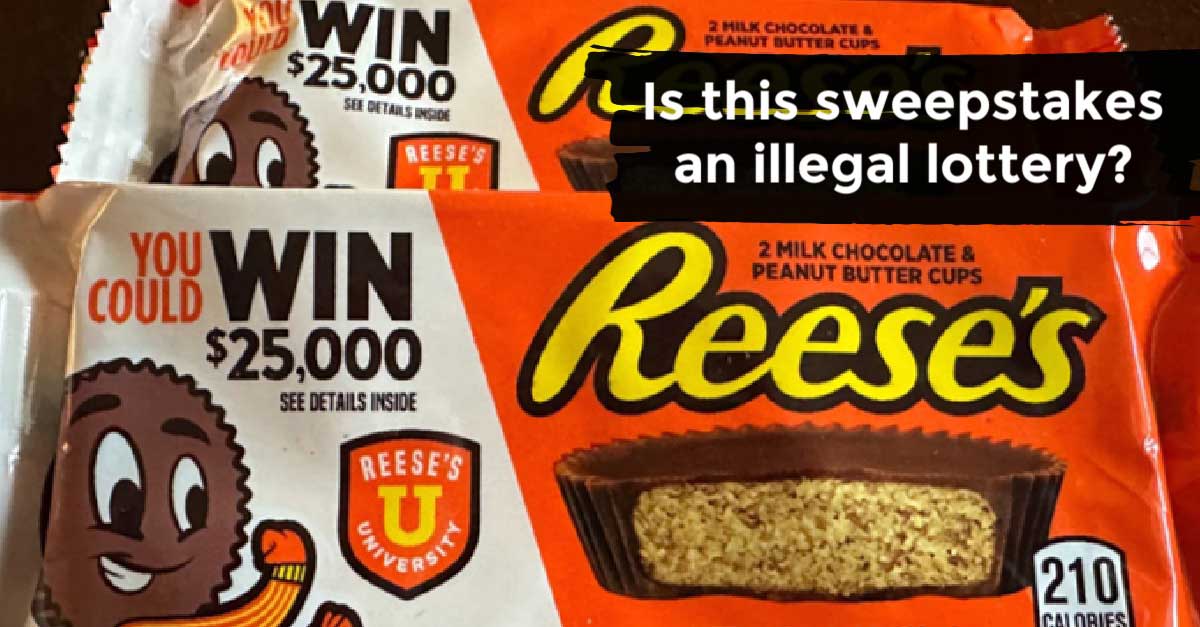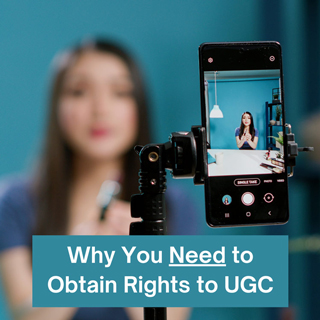Reese’s Sweepstakes Errors Highlight Lottery and Contest Rules
Did Hershey’s Run an Illegal Lottery?
It’s a regular occurrence to see sweepstakes advertised when you shop – especially on product packaging. This is exactly what consumers saw on packages of Reese’s Peanut Butter Cups stating, “You Could Win $25,000” accompanied by, “SEE DETAILS INSIDE” written in smaller, but still very visible, print. It stands to reason that the only way to see inside the package is to buy it first.
Is this a big deal or an actual legal concern? After all, the cost of this product is less than $2.00 which is very little to shell out for the chance to win a decent amount of money. But here is the thing: sweepstakes are highly regulated to prevent purchase entry methods from seeing the light of day. Entering a sweepstakes by making a purchase for the chance to win a prize is fraught with inherent unfairness because it has the potential to favor only those who can afford to play. Plus, the flow of profits goes back to the sponsor (i.e. Hershey’s Co.) which raises legitimate questions about the brand’s reason for running a sweepstakes in the first place.
Who Regulates Sweepstakes and Lotteries?
Three federal agencies – the Federal Trade Commission (FTC), the Federal Communications Commission (FCC), and the U.S. Postal Service – enforce laws governing sweepstakes. State regulatory agencies, in addition to Attorneys General, also keep an eye on sweepstakes and can enforce stringent repercussions. In this case, Edgar Dworsky, who is a former assistant Attorney General in Massachusetts, has questioned the legality of this sweepstakes. Hershey’s Co., could end up being fined or even banned from running sweepstakes if a case is brought against them and won in the court of law.
Why are Sweepstakes and Lotteries Regulated?
The reason safeguards for sweepstakes, which are also classified as “games of chance,” exist is to ensure consumers are not misled, prizes are dutifully awarded, and to prevent companies from running illegal lotteries. By failing to put “No Purchase Necessary” and details on where to enter without buying Reese’s Peanut Butter Cups, Hershey’s Co., blurred the line between running a legal sweepstakes versus an illegal lottery.
It’s not that lotteries are illegal in the United States. It’s that the only entity that can legally operate a lottery is a state government. We know our early founders and legislators often gambled, participated in sweepstakes, and even authorized lotteries to fund schools and roads. However, for hundreds of years, the legality of lotteries has ebbed and flowed – with good reason because of the ethical and moral issues involved. By 1895 the corruption surrounding lotteries was so vast, they were prohibited. New Hampshire was the first to offer a state lottery in 1964 and as recently as 2019 Mississippi also legalized this form of gambling. As of today, only a handful of states (Alabama, Utah, Alaska, Hawaii, and Nevada) have refrained from legalizing a state-run lottery.
One reason why these states have not legalized lotteries stems from religious beliefs about the ethics of gambling. Another reason is to avoid competition; this is especially true in a state like Nevada where revenues from casinos would be diluted if convenience and grocery stores sold lottery tickets. One of the more compelling reasons to prevent the legalization of a lottery is because a disproportionate number of participants are from lower-income communities as found by the Howard Center for Investigative Journalism (read more about this at Mega Billions: The great lottery wealth transfer – CNS Maryland). The moral and ethical dilemmas surrounding lotteries are valid and explain why so many marketing dollars are spent touting the social good they accomplish.
What is an Illegal Lottery?
An illegal lottery is a promotional structure that includes three elements: chance, prize, and consideration.
- Chance means there is an opportunity to win via a random drawing or even matching a lucky number.
- The prize can range from a gift card to cash to a trip or even a new car.
- Consideration typically consists of an entry fee but can also be a substantial amount of effort or time.
To successfully run a sweepstakes instead of an illegal lottery, one of the preceding three elements must be eliminated. The “see details inside” language on the packaging can only be done if the item is purchased. There were claims from Hershey Co. that the packaging contained QR codes with more information on how to enter without a purchase but QR codes were not found on the product after a spot check was done. Also, we posit that a QR code is not sufficient to indicate in a meaningful and transparent way that details about how to enter for free can be located by following it.
Is the FTC Investigating the Reese’s Sweepstakes?
At this time, the FTC has not confirmed or denied an investigation against Hershey Co. We will continue to watch this topic to see what happens next. In the meantime, always clearly state how people can enter for free if a purchase element is part of your sweepstakes. We never want our clients to encounter legal friction when they run a sweepstakes; even if there is no formal lawsuit or penalties issued, being a poster child for something that runs askew to what might be legal isn’t an ideal experience for any brand. Particularly in this day and age when inflation and corporate greed continue to be hot topics on the minds of consumers. A sweepstakes is supposed to engage consumers and elevate brand trust instead of alienating consumers and eroding brand trust.



